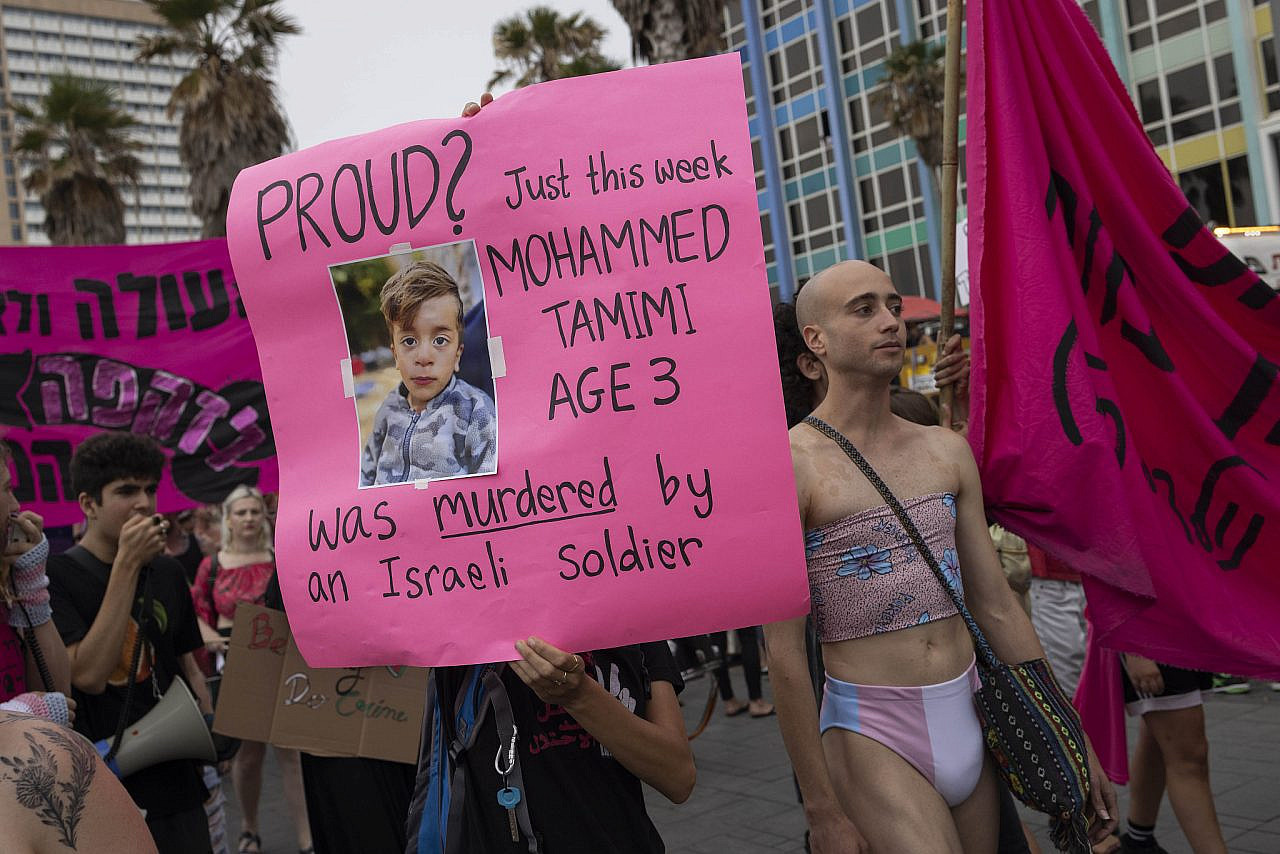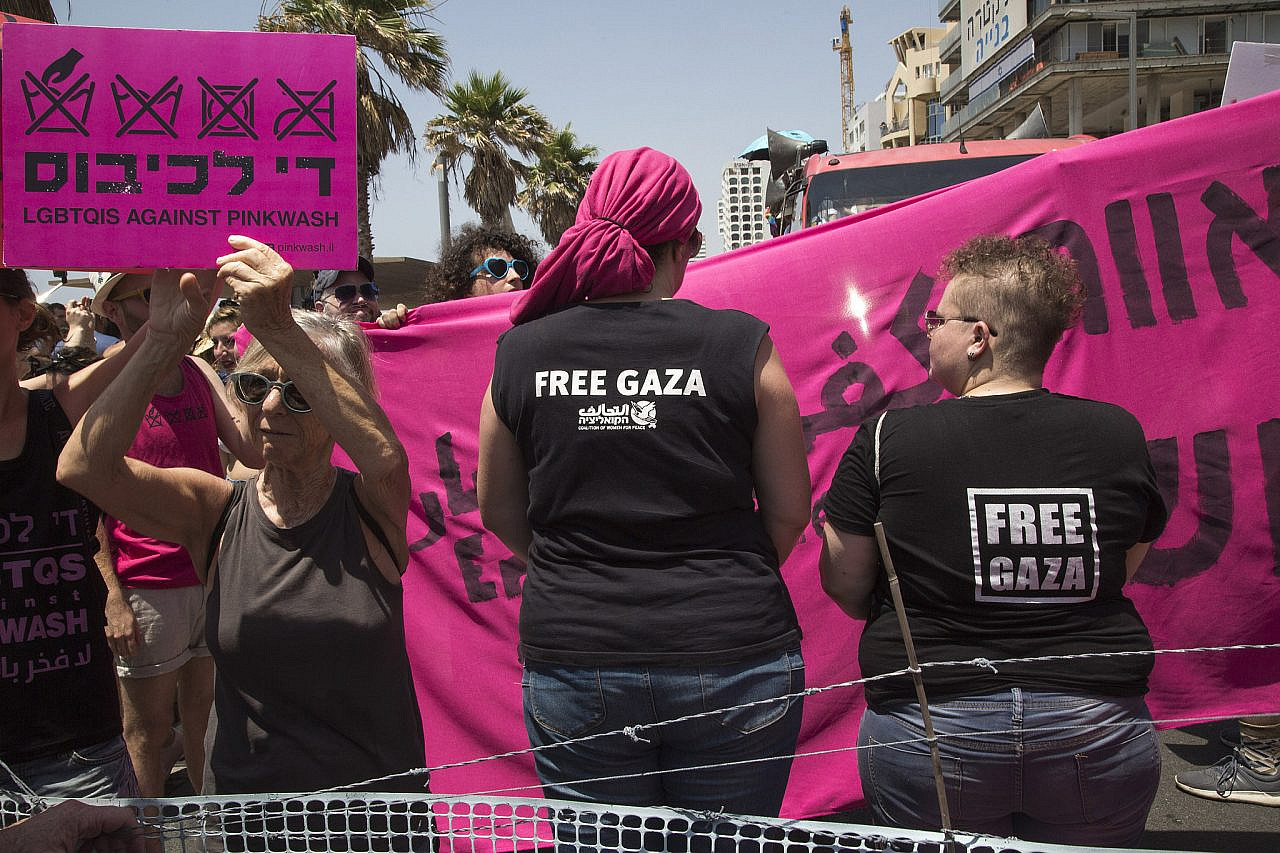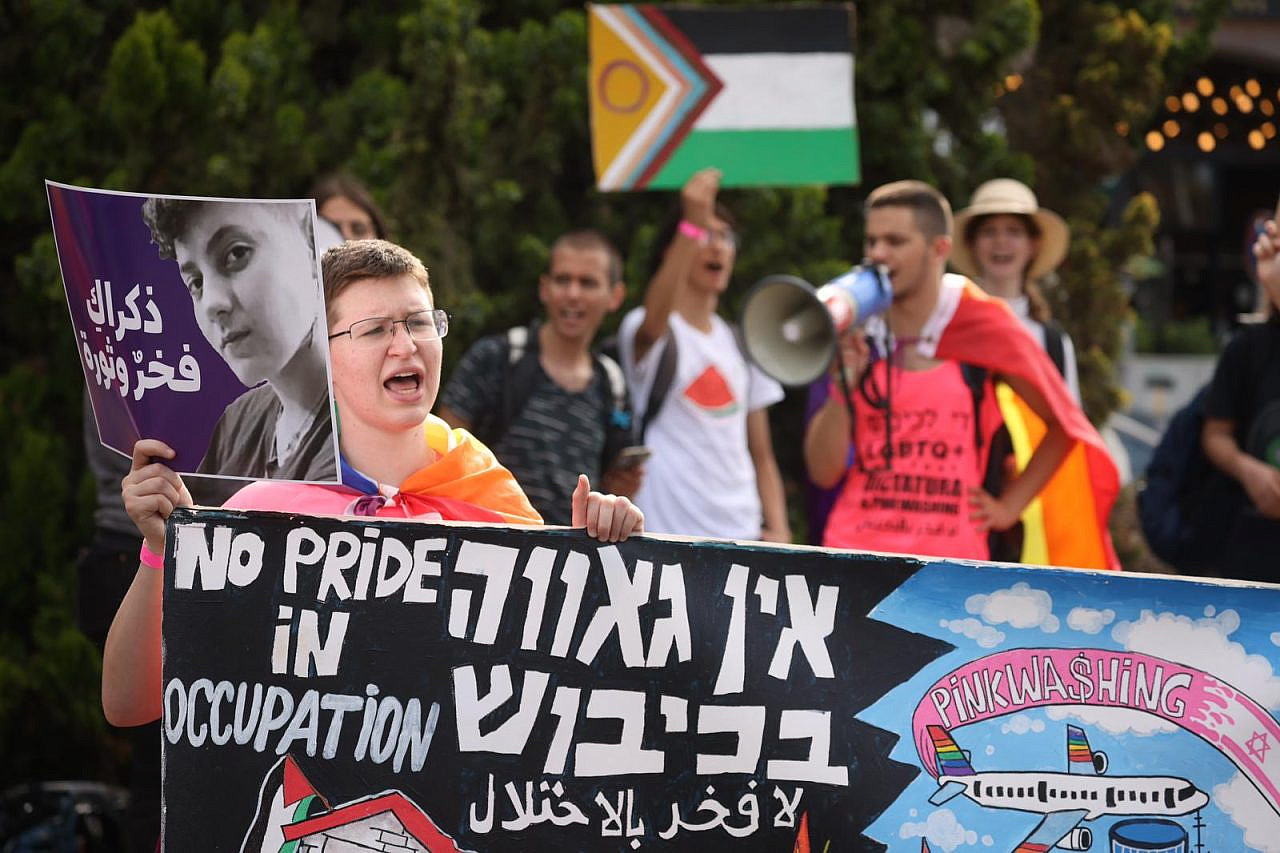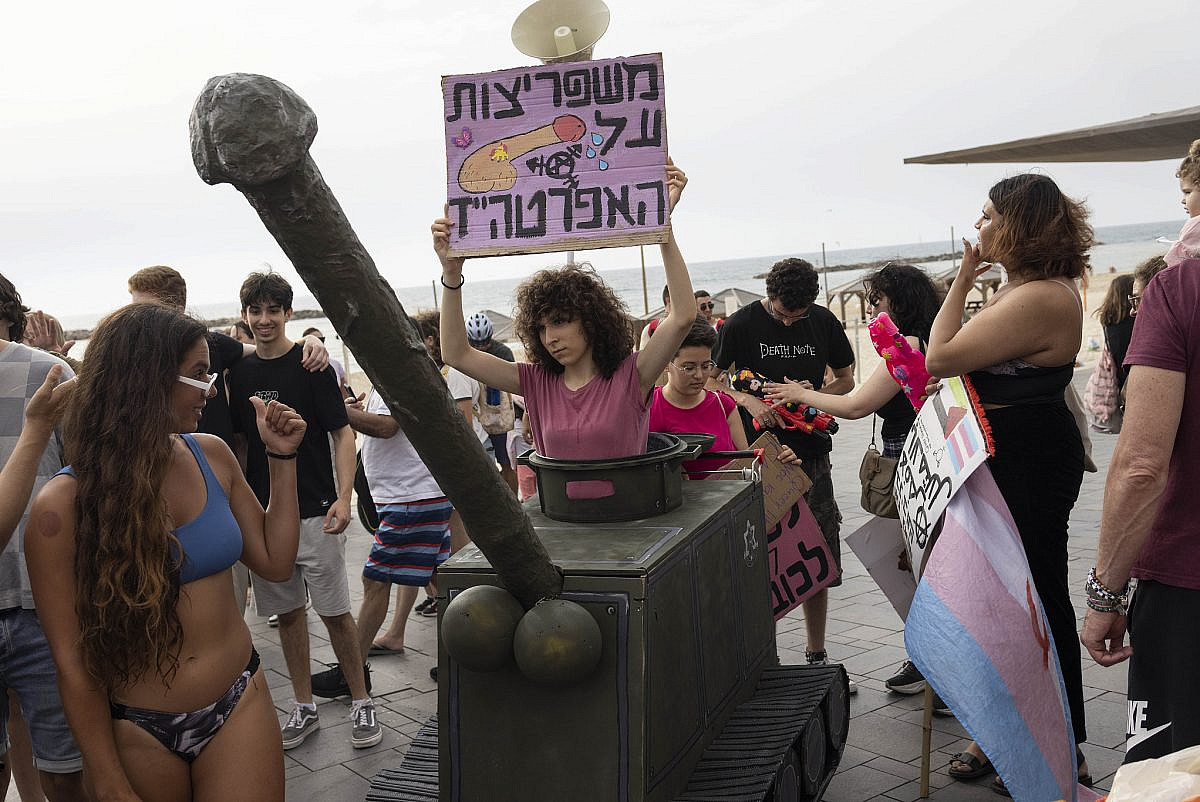Amid the sea of revelers, rainbow flags, and commercial floats that made up last week’s Pride march in Tel Aviv, one sight stood out: a group of activists who had brought a model tank, with its turret swapped out for a 1.5-meter-long phallus painted military green. Although police did not allow the “tank” to enter the official parade, many of the marchers eagerly rushed to have their picture taken with it on the sidelines.
In addition to symbolizing the domineering and near-lustful violence of the Israeli military, the tank was intended to levy a second, more biting critique: the LGBTQ community’s “desire to integrate into the violent body of the military,” according to Einat Gerlitz, an activist who spent 87 days in jail for draft refusal, and who took part in the tank protest. “The most painful thing is to see LGBTQ people, who have personally experienced exclusion and discrimination, then inflict the same violence on others. It’s sad that the state has succeeded in making many think that integrating into the Zionist enterprise is the way to integrate into society.”
The tank protest is part of a series of demonstrations organized by a group of radical activists throughout Pride month against pinkwashing — known in Hebrew as “kibus” (literally “washing clothes”, used in this context as a play on the Hebrew word for occupation, “kibush”). The activists are critical of how the Israeli government and corporations coopt LGBTQ Pride in order to sanitize or obscure various injustices — above all the occupation. Anti-pinkwashing protests are not new, but this year they have attained even greater significance because of the avowed homophobes in the governing coalition, such as Avi Maoz, head of the anti-LGBTQ Noam party. Maoz’s running mates, Finance Minister Bezalel Smotrich and National Security Minister Itamar Ben Gvir, were responsible for organizing the notorious “beast parade” in protest of the Jerusalem Pride march in 2006.
Under previous Israeli governments, Gerlitz said, pinkwashing was more about saying: “Look at our LGBT paradise in a conservative jungle.” Now, despite the virulent homophobia in the coalition, the government is doubling down on its supposed acceptance of the queer community. Social media accounts of the State of Israel and the Israeli embassy in Washington boast, in English, about the Pride parades and the “love, equality and acceptance” they represent — while ignoring the fact that even LGBTQ Jews do not benefit from equal rights, let alone LGBTQ Palestinians living under Israeli control.
“In Tel Aviv they are trying to create a sterile space where LGBTQI people can party without having to be aware of the occupation,” Gerlitz continued, “where they can forget that just a few minutes from here, in Jaffa or south Tel Aviv, things are different.”

Connecting struggles
Two weeks ago, hundreds of activists formed an anti-pinkwashing bloc in the Jerusalem Pride parade, where they were attacked by police who tried to confiscate their Palestinian flags. In Tel Aviv a week later, more than two hundred activists marched in the bloc, and were attacked several times by other protesters. This week, three activists were arrested during the march in Haifa when undercover police officers attacked the bloc with extreme violence after seeing a trans teenager carrying a Palestinian flag. Next week they plan to march in Be’er Sheva.
“The bloc is calling for queer liberation, and for a shift from nationalism and capitalism to solidarity,” said Yahli Agai, a young trans woman and activist. “The government, the army, the Tel Aviv municipality, and corporations are carrying out injustices, but during [Pride] month they drape themselves in Pride flags and superficially support the parade to whitewash their actions. Our protest is against the occupation and the injustices that directly harm the queer community, such as the military’s extortion of LGBTQ Palestinians, or the fact that the Tel Aviv municipality doesn’t support sex workers or the unhoused population, many of whom are trans.”
“We are fighting not just for Jewish gay men who want to have children through surrogacy, but also for the trans community, gay Palestinians who have been murdered, and Sarit Ahmed,” Gerlitz said, referring to a Palestinian teenager who was murdered this month for being openly lesbian. For Gerlitz, these issues are intimately connected: “When I came out, the heteronormative mainstream didn’t want me in it. Then, when I refused military service, I wasn’t welcome because I was challenging society’s norms around the military. The feelings were similar. I connect the dots between the different struggles.”
Maya Bedarshi Kirshen, a genderqueer teenager, sought to remind Pride marchers that “The queer community built the parade, not the government and not the municipality. Now it’s become more mainstream, and everyone wants a piece of the cake. It was only 20 years ago that police were dispersing LGBTQ people at Wigstock [a drag event in Tel Aviv, which police broke up wearing gloves out of fear of contracting HIV]. Today the police want to show that they aren’t homophobic.”

The anti-pinkwashing bloc has participated in the Pride parade for many years. In 2001, the queer anarchist group Black Laundry marched in Tel Aviv under the slogan, “There’s No Pride in Occupation.” Inspired by the same phrase, activists protesting in last week’s demonstration against the judicial overhaul spray-painted in huge letters on Tel Aviv’s Kaplan Street: “There’s No Pride in Dictatorship.” In 2018, the bloc brought a model of the separation wall to the Pride parade in Tel Aviv and blocked its route, in solidarity with the Great March of Return protests along the border fence in Gaza.
Even as the activists critique the party atmosphere at Tel Aviv’s Pride parade, they emphasize that their goal is to present their own protest as an honest but equally fun alternative. “Our protest is to be happy in a subversive way,” Agai said. Bedarshi Kirshen agreed: “Celebrating queerness is very important, and we shout with joy and humor in our slogans.” Those slogans include “We fuck in the ass, and no soldiers are born from that,” and “Come on bro, put on a dress and we’ll bring down the government.”
‘The army is the biggest pinkwasher’
On June 21, a network of draft refusers will organize a first-of-its-kind protest outside the headquarters of the military intelligence unit known as 8200, which is notorious for blackmailing LGBTQ Palestinians who are not out of the closet – threatening to expose them if they don’t agree to become informers for the army – as part of its intelligence-gathering activities. In April, a resident of Nablus was murdered after the Lion’s Den, a local militant group, claimed he had been collaborating with Israel; in a video filmed before he was executed, the victim said Israel had used his sexual orientation to extort him.
“The army is the biggest pinkwasher,” Agai said. “On the one hand, they kind of welcome LGBTQ people into the military system, and part of the queer community adopts a nationalistic, militaristic discourse. On the other, the military and intelligence services deploy anti-LGBTQ practices in a clear, violent, and brutal way. Dissenting members of 8200 have testified that the intelligence services try to locate LGBTQ [Palestinians] in order to blackmail them and lead them to betray their family and friends.”

The anti-pinkwashing bloc also protests against other social injustices that intersect with challenges faced by the LGBTQ community. Several activists marched in solidarity with Givat Amal, the now-destroyed Tel Aviv neighborhood whose working-class Mizrahi residents were forcibly evicted by a real-estate tycoon in 2021, and carried signs against other evictions in Tel Aviv and Jaffa.
While housing issues affect a broad range of Israeli society, the activists argue that the municipality’s failure to offer public housing, and its exclusive focus on building luxury apartment towers, levies an additional and painful impact on the LGBTQ community. As activist Si Berabi explained, queer people are caught in a bind: because of the rise in homophobic attacks across Israel, members of the community feel more secure living in Tel Aviv, but the skyrocketing cost of living is pushing them out.
It remains to be seen whether this intersectional approach will inspire a broader group to join in the activists’ struggle for justice. “There’s still pinkwashing, but many LGBTQ people in Israel are picking up on it now,” Bedarshi Kirshen said. “I see queer people who say: ‘In English, you embrace us, and in Hebrew, there’s Avi Maoz.’ The dissonance is more obvious.” Activists in the anti-occupation bloc at the weekly protests against the judicial overhaul report a similar phenomenon: the current government’s extremism is enabling activists on the left to speak more openly about a variety of issues that, in the past, were publicly taboo.
Most read on +972
And yet, the activists are still met with pushback. “There were almost no negative reactions in Jerusalem, but in Tel Aviv there were people who were ‘offended’ by [our] message,” Bedarshi Kirshen said. “[But] as the government becomes more racist and homophobic, these issues come up. I don’t know how much it’s possible to persuade the mainstream on the issue of LGBTQ Palestinians. I hope I’m mistaken.”
Agai, however, sees reason to hope. “The more overtly hostile the government is, the less people will fear criticizing it,” she said. “Many people can undergo a kind of radicalization.”
A version of this article was first published in Hebrew on Local Call. Read it here.






